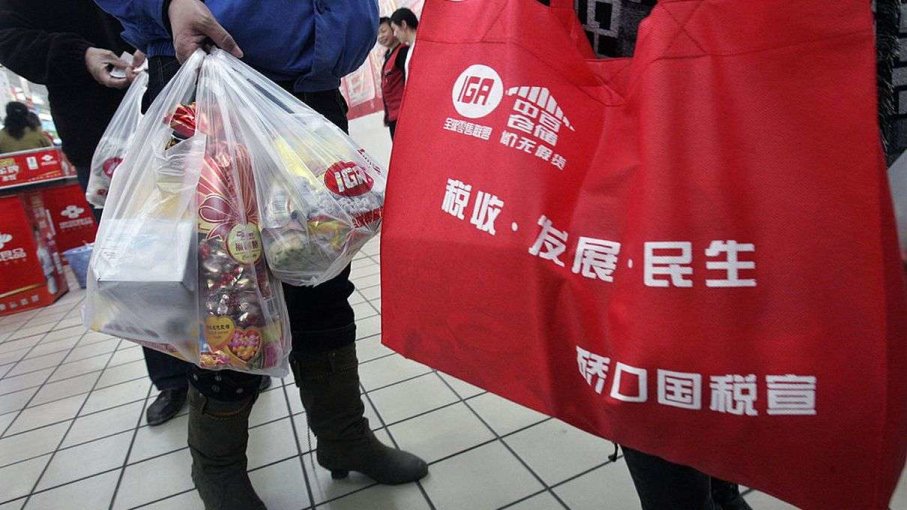China has announced a wide range of measures to put an end to the environmental blight that has tainted much of its land and rivers, but just how effective will it be?

Efforts to get rid of plastic, the modern world’s most ubiquitous material, are riddled with challenges.
However, the world’s largest producer of plastic might just be on its way to eliminating plastic trash from its streets, rivers and coastlines within the next decade.
In a bid to tackle one of its most pressing environmental issues, China has introduced sweeping measures targeting the sale and production of plastic, including a ban on manufacturing ultra-thin plastic bags, disposable foam plastic tableware and plastic cotton swabs.
Its National Development and Reform Commission and the Ministry of Ecology and Environment revealed on Sunday a set of wide-ranging guidelines that include banning plastic bags in major cities such as Beijing, Shanghai and Guangdong by the end of the year.
Small cities and towns have until 2022 to phase plastic bags out.
By 2025, all hotels and hostels will be banned from offering single-use plastic items such as toothbrushes and shampoo bottles for free, while mail and delivery services will be prohibited from using plastic packaging and plastic bags.
In five years, markets hawking fresh produce are also expected to get in line with the new regulations.
The news comes two months after the Chinese government revealed that its largest garbage dump — the size of approximately 100 football fields — had reached full capacity 25 years ahead of schedule.
“Banning the manufacturing of plastic is what no other country has ever talked about. We’ve heard about local bans on plastic bags, or a 1 dollar levy per bag, which forces the consumer to reduce demand,” said Richard Brubaker, founder of Shanghai-based sustainability advisory firm Collective Responsibility.
“What the [Chinese] government is doing now is reducing the supply, which will increase the cost of plastic and make the consumer pay for it. This re-balances the economic equation around plastic in the right direction,” he added.
Chinese plastic manufacturers are responsible for almost 30 per cent of global plastic production.
Although more than a hundred countries have either imposed some kind of ban or tax on plastic bags, global plastic production is predicted to double by 2040, accounting for around 20 per cent of the world’s oil production in the next 30 years.
Are bans any effective?
This is not the first time China has introduced a ban on plastic, nor is it the first country to do so.
In Asia, Malaysia has a plan to wipe out single-use plastic by 2030, while cities in Indonesia, India and the Philippines have introduced either a levy or a partial ban on plastic items in restaurants, hotels and retail stores.
Critics have expressed that while imposing a strict ban on plastic might be the most effective, visible way for a government to tackle its plastic problem, the lack of enforcement, supporting infrastructure and viable alternatives to plastic make it a tricky business.
When the Indian state of Maharashtra banned plastics in 2018, a backlash from small traders and multinational corporations alike resulted in the government retreating from their initial statement.
Single-use plastic products such as bottles, food and product packaging and garbage bin liners became exempt from the rules.
In Kenya, where the penalties for using, manufacturing and distributing plastic are among the world’s most punitive, bag cartels have sprung up, smuggling illegal plastic bags from neighbouring Uganda and Tanzania.
“With all these new regulations, the proof of success will be the implementation, because you need to have enforcement and monitoring to make it work. For a country as large as China, it begs the question of how effective a ban will be,” said Edwin Seah, head of sustainability and communications at Food Industry Asia, a food and beverage industry association based in Singapore.
However, Seah added that the ban will probably be more effective in China compared to other countries “because of the way things are run there,” especially if it comes with the support of retailers.
“India does not have the systems or infrastructure to execute policies such as a wide-ranging ban. China has the resources to deploy this programme. Its propaganda machine is vastly different from other countries in Asia, and single-party rule means things are filtered to local governments easily,” echoed Brubaker.
In China, the authorities in charge of inspecting for food safety and hygiene will be the same ones making rounds to check whether restaurants and households were using or distributing single-use plastic, he revealed.
“The mechanism is already in place. Plastics will just be one more thing to look out for,” Brubaker said.
According to Professor Seeram Ramakrishna, chairman of the Circular Economy Taskforce at the National University of Singapore, plastic bans are effective in bringing awareness to the public, and nudging businesses and organisations to switch to products, services and practices that will provide a more conducive environment for innovation.
However, he describes bans as “not absolute solutions” even though they serve the purpose of partially alleviating a growing global problem.
To fix what is essentially a systemic problem, he believes that solutions should look at designing materials and products that would encourage the circular economy of plastic, and encourages greater investments and incentives in this space.
“More needs to be done in terms of promoting innovation, making better alternatives viable, and changing the culture via long range thinking, strategies and action plans,” said Ramakrishna.
Having real alternatives to cheap and durable plastic packaging that also have less of an impact on the environment is something that Seah deems crucial to the conversation around plastics in Asia.
“When you have a total ban on single-use plastics where there are no alternatives, you worry about things like fresh food and issues related to hygiene and food safety,” said Seah. This is a particularly big issue for low income countries which depend heavily on plastic to transport food to places which lack access to basic commodities.
“You can ban single-use plastic if you can afford your citizen drinkable tap water and make this readily available. It’s always important to have more holistic planning, while considering different policy sets and levers. It’s not just all out banning plastic.”
However, Brubaker expects China’s plan to eventually wipe out plastic from its roads and rivers to be successful.
“When I think about the ripple effect of China’s economy and its value chain, I get hopeful. If Shanghai gets off plastic bags, why can’t Singapore do the same?” he said, referring to the much smaller city-state, which has refrained from introducing nationwide policies on single-use plastic.
In November last year, Singaporean supermarket giant NTUC Fairprice started charging customers for plastic bags after a month-long trial and a no-plastics drive by local green groups.
“Singapore incinerates its trash and does not face the problems that China has with regards environmental degradation and managing its vast resources in soil, air and water to feed itself. The Chinese government believes that banning plastics will put their economy and businesses in a better position and keeps them ahead of the curve,” said Brubaker.
“More government involvement typically leads to less efficiency, unless of course, it works. This country is saying: Let’s ban all these bags from being manufactured in the first place.”




